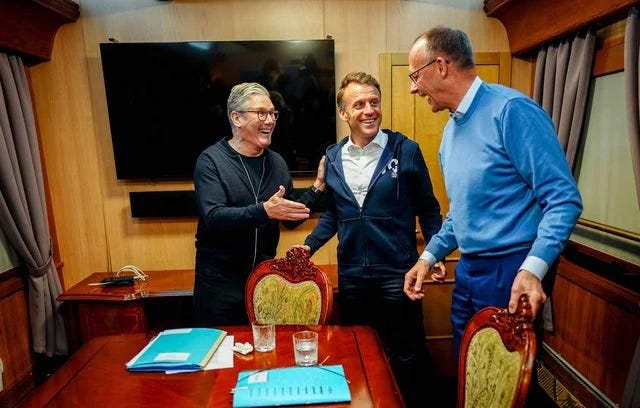The misjudgments, hubris, and inadequacy of Europe’s leadership are increasingly undeniable. Let’s not dwell on the surreal scene in the train carriage, where the German Chancellor, UK and Polish Prime Ministers, and French President, looking rather unkempt, shared hearty laughs after their latest sideshow to Ukraine. Traveling to Kyiv to urge Moscow for a ceasefire speaks volumes about their disconnect.
Trump remains an orange outrage, we’re told, a brash, simplistic dealmaker lacking the sophistication for global affairs, risking instability both at home and abroad by approaching complex issues with a transactional mindset. Some even lament the potential erosion of America’s democratic principles under his leadership.
Evidence suggests Trump is advancing his agenda with measurable success.
Domestically:
Federal spending has been curtailed by 5.5% in Q1 2025, reflecting fiscal discipline.
The economy is robust, with unemployment at 4.2% and over 150,000 jobs added monthly, though concerns linger over rising long-term unemployment.
The S&P 500 index has surged 14% year-to-date, signaling strong market confidence.
Real estate is flourishing, with new construction projected to rise 12% in 2025.
A bold initiative to slash prescription drug prices by 30 to 80% has been announced, revisiting a 2020 proposal previously stalled by pharmaceutical industry lawsuits.
On the global stage:
Donald Trump, for all his AI-enhanced graphic stunt, has achieved a historic milestone by facilitating the election of the first American pope.
His tariff policy has yielded results, prompting renewed trade negotiations amid the WTO’s two-decade-long dysfunction.
On May 11 in Geneva, talks with China culminated in a temporary 90-day mutual tariff reduction, paving the way for discussions on a longer-term agreement.
The U.S. has reengaged with Hamas while distancing itself from the Netanyahu government, marking a significant policy shift.
Ongoing Russo-American dialogues, with Ukraine as a secondary concern, are advancing steadily. The directive for Zelensky to negotiate in Turkey at Putin’s behest represents another setback for European influence, marginalized in resolving the conflict.
In contrast:
Emmanuel Macron’s high-profile reception of Al Jolani, a former ISIS and Al Qaeda figure now leading Syria, at the Élysée has sparked outrage, dishonoring the memory of over three hundred French victims of Islamist attacks since 2015. This alignment with a criminal figure casts a lasting shadow.
Friedrich Merz secured the German chancellorship only after a second-round vote, having abandoned key campaign pledges such as curbing mass immigration and reviving nuclear energy. His approval rating stands at a mere 14% before his tenure even begins.
Keir Starmer faced a devastating loss in UK local elections, with Nigel Farage’s Reform UK party dominating the results.
Whatever one’s view of the current U.S. president, his administration demonstrates tangible action beyond mere rhetoric. European leaders, by contrast, appear preoccupied with cosy gatherings and selfies.



